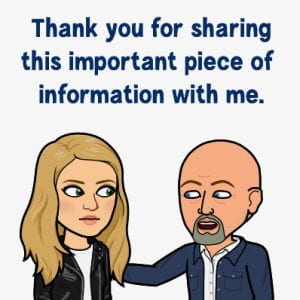 Ever have a situation you had to describe months (or even years) after it took place? When we have to operate from memory, things may not be as we recall. This is why documentation is the best friend (or enemy) of the school leader. An attorney once told me that if it wasn’t in writing it didn’t happen. This was early in my leadership career and I have learned, both for good and bad, the importance of having documentation of events. We might feel that writing down everything that happens in given situations is cold or calculated, even a bit ominous. Yet, if we are focused on ensuring we have our facts correct, documenting is essential.
Ever have a situation you had to describe months (or even years) after it took place? When we have to operate from memory, things may not be as we recall. This is why documentation is the best friend (or enemy) of the school leader. An attorney once told me that if it wasn’t in writing it didn’t happen. This was early in my leadership career and I have learned, both for good and bad, the importance of having documentation of events. We might feel that writing down everything that happens in given situations is cold or calculated, even a bit ominous. Yet, if we are focused on ensuring we have our facts correct, documenting is essential.
How can we best document our work, conversations, interactions, and the like? There are many ways to do it and it needs to best match your own style. If you are super techie, find an app or use your notes on your phone. More of a notebook person, have one that is dedicated to specifically journaling your day. No matter which way you choose to collect your artifacts, here are three hacks to ensure you’ve archived your work in an appropriate manner. Here are three documentation hacks to help you ensure you’ve covered your bases and kept your facts straight.
- Document the positives: so often, people thing that documentation means putting in writing when someone has behaved in a poor manner.
 While that can be true, it doesn’t always have to be. If you put your focus on the positives happening in your school, you will find a lot of great things. Focusing on the positives and documenting them is excellent practice and helps to refine your methods for overall documentation. If we only focus on documenting negative behaviors, we aren’t presenting a full picture of any situation. Document those positive things by sharing them out, taking photos, blogging about it, or sending an email saying thank you to a staff member for something awesome they did.
While that can be true, it doesn’t always have to be. If you put your focus on the positives happening in your school, you will find a lot of great things. Focusing on the positives and documenting them is excellent practice and helps to refine your methods for overall documentation. If we only focus on documenting negative behaviors, we aren’t presenting a full picture of any situation. Document those positive things by sharing them out, taking photos, blogging about it, or sending an email saying thank you to a staff member for something awesome they did. - Document your conversations: this is one of the hardest parts of documentation.
 The conversation that happens in the hallway that merits being written down. It might be something a staff member said or did. It could be something someone shared with you or was concerned about that led to you needing to write it down. My process, which I occasionally struggled to stick to, was make a quick note in my phone and then write it further during a block of time I set aside for email and other ‘desk duties’.
The conversation that happens in the hallway that merits being written down. It might be something a staff member said or did. It could be something someone shared with you or was concerned about that led to you needing to write it down. My process, which I occasionally struggled to stick to, was make a quick note in my phone and then write it further during a block of time I set aside for email and other ‘desk duties’. - Once you are in writing, stay in writing: this is typically reserved for employee discipline or for poor overall job performance.
 We can have those verbal conversations (documented as in #2). We might have times when a verbal warning (also documented) is warranted for a situation. However, once you begin documenting and disciplining in writing, stay in writing. Don’t go back and forth, don’t allow for the he said-she said game to even begin. If you find yourself in meetings with a staff member that require written reprimands, written documentation of warning, etc, all of your communication with that employee needs to stay in the written realm. This might be as simple as having a scribe for your meetings to take minutes and having each of you initial (or sign) to verify the notations. It could be a written summary of a meeting, or even a letter of warning or reprimand.
We can have those verbal conversations (documented as in #2). We might have times when a verbal warning (also documented) is warranted for a situation. However, once you begin documenting and disciplining in writing, stay in writing. Don’t go back and forth, don’t allow for the he said-she said game to even begin. If you find yourself in meetings with a staff member that require written reprimands, written documentation of warning, etc, all of your communication with that employee needs to stay in the written realm. This might be as simple as having a scribe for your meetings to take minutes and having each of you initial (or sign) to verify the notations. It could be a written summary of a meeting, or even a letter of warning or reprimand.
Bonus: Here is one surefire documentation method.  After a meeting or conversation that you not only need documented but want to ensure the other party knows it’s documented, send an email with a summary of the conversation to that person. Include details, what was said by each of you, and what was agreed upon, directed to be done, etc.
After a meeting or conversation that you not only need documented but want to ensure the other party knows it’s documented, send an email with a summary of the conversation to that person. Include details, what was said by each of you, and what was agreed upon, directed to be done, etc.
Look, nobody says that keeping up on documentation is fun. It is a necessary and essential function, however, for all school leaders. It is rare but when your work is questioned in a legal fashion, having your documentation in order can be the difference between a favorable outcome for you and/or your district and ultimately losing an employment claim. Again, it’s not fun but please take this part of the job seriously and devote the time needed to be accurate and complete in your record keeping.
Have a #RoadToAwesome week
Darrin
Tune in this week to “Leaning into Leadership” where my guest is celebrated school leader and author Bradley James Davies.
Need some help? Got a question? Reach out, let’s talk.
Learn more and sign up for our weekly newsletter, loaded with awesome content at roadtoawesome.net
Make sure you subscribe (button on the left) so you don’t miss any future posts.
Road to Awesome: The Journey of a Leader is now available. Click here to purchase the autographed copy.
Want to buy the book on Amazon instead? Click here
Looking for that awesome speaker with an incredible message to build your staff culture? Look no further – connect with me here

Be First to Comment